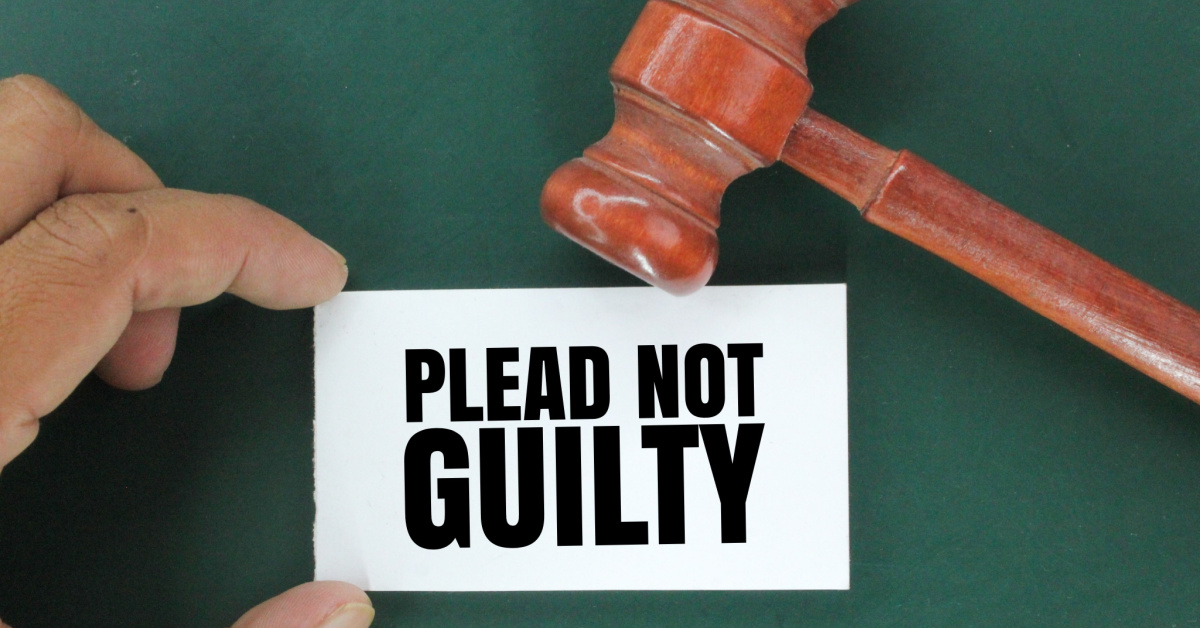Pleading not guilty to DUI might seem like a bold move—especially if you’ve been pulled over, arrested, and handed a breathalyzer test that wasn’t exactly in your favor. But pleading not guilty is not an admission of innocence or denial of facts; it’s a legal strategy rooted in protecting your rights and demanding that the prosecution prove their case beyond a reasonable doubt. This process often unfolds differently than with other traffic-related or misdemeanor offenses.
In this in-depth guide, we’ll unpack key differences between pleading not guilty to DUI and similar offenses, such as reckless driving, public intoxication, or basic traffic violations. Through real-world examples, courtroom analysis, and storytelling, we’ll help you understand how DUI cases differ from what many people think of as minor legal hiccups—and why choosing to plead not guilty could make or break your future.

The Legal Meaning Behind Pleading Not Guilty to DUI
Let’s begin with the basics: what does pleading not guilty to DUI actually mean? When you plead not guilty, you’re exercising a constitutional right. You are not saying, “I didn’t do it,” so much as you’re saying, “Prove it.”
This plea triggers a legal process that allows your attorney to:
- Review the evidence
- Challenge police procedures
- Cross-examine witnesses
- Possibly suppress test results
- Negotiate better outcomes—or beat the charge
With other offenses, such as speeding or improper lane change, a plea of not guilty usually leads to a short court appearance or plea deal. But with DUI, everything ramps up. The stakes are higher, the penalties harsher, and the courtroom strategy more involved.
Real-World Story: Why Julian Pleaded Not Guilty to DUI
Julian, a 29-year-old teacher in Fort Worth, was pulled over after a late-night dinner party. He admitted to having two glasses of wine, and the officer asked him to perform a field sobriety test. Nervous and tired, Julian didn’t do well. He blew a 0.08—right on the legal limit.
Instead of pleading guilty, Julian hired a DUI attorney and entered a not guilty plea. Why? His attorney suspected the breathalyzer machine had not been properly calibrated. Turns out, they were right. The maintenance log showed irregularities. At trial, the defense discredited the BAC reading, and Julian was acquitted.
This story illustrates why pleading not guilty to DUI isn’t reckless—it’s strategic. It opens the door to investigate, push back, and possibly avoid lifelong consequences.
How DUI Differs from Other Offenses at the Plea Stage
When someone is charged with speeding or even reckless driving, the charge is usually infractions or class C misdemeanors. These cases don’t involve jail time, and pleading not guilty may only buy time for negotiating a fine or defensive driving course.
DUI, however, is a criminal misdemeanor or even a felony in certain cases. That makes the stakes drastically different:
- Evidence collection is more complex: DUI cases involve bodycam footage, field sobriety tests, chemical test results, and often expert testimony.
- License suspension kicks in early: DUI cases often come with administrative license suspension before you even step into court.
- Potential for jail: A guilty plea in a DUI case, even for a first-time offense, can include mandatory jail time in some jurisdictions.
- Insurance penalties spike: A DUI carries long-term SR-22 insurance requirements, which is far more serious than a typical ticket.

These distinctions make the act of pleading not guilty to DUI fundamentally different from defending against a basic traffic offense.
Challenging DUI Evidence: What Makes a Not Guilty Plea Work?
Unlike a speeding ticket—which often relies solely on the officer’s radar or testimony—DUI charges lean heavily on:
- Breathalyzer or blood test results
- Field sobriety tests (FSTs)
- Officer observations (e.g., bloodshot eyes, slurred speech, odor of alcohol)
- Dashcam or bodycam footage
- Statements made during the arrest
Pleading not guilty gives your defense the opportunity to scrutinize each of these items. A smart DUI defense may challenge:
- The legality of the traffic stop
- The accuracy of the breathalyzer
- The training of the arresting officer
- The handling of blood test samples
- The admissibility of your statements
That level of scrutiny isn’t typically necessary in cases like running a red light or failing to yield. But for DUI charges, it’s essential.
Real-Life Story: Sasha’s Refusal to Plead Guilty Pays Off
Sasha was arrested for DUI after a concert in Houston. She refused the breathalyzer, and the officer claimed she appeared intoxicated. With little more than subjective opinion and a few field test notes, the case seemed weak.
Sasha pleaded not guilty, and her attorney argued that the officer had no reasonable suspicion to initiate the stop in the first place. Dashcam footage backed that claim. Her case was dismissed.
Had she pleaded guilty—thinking it would be the “easy way out”—she would’ve paid thousands in fines, lost her license, and possibly her job in social services. Pleading not guilty to DUI gave her time to mount a proper defense—and it worked.
The Administrative vs. Criminal Side of DUI Cases
Another key reason pleading not guilty to DUI is more complex than other traffic charges lies in the dual-track system many states use. In DUI cases, you’re facing two battles:
1. Criminal Charges in Court
This is where guilt or innocence is determined, and where penalties like jail, fines, and probation are handed down. The courtroom process also includes arraignment, pre-trial motions, and sometimes a jury trial if the case proceeds that far. Every statement made and every piece of evidence introduced can significantly affect the final outcome, which is why this stage demands a skilled legal defense.

2. Administrative License Suspension (ALS)
This is handled through the DMV or equivalent agency. Your license may be suspended automatically if you refused testing or failed a breathalyzer—even before conviction.
By pleading not guilty, you gain time to request a hearing on the ALS and potentially challenge it. This administrative layer is almost never triggered for lesser charges like failing to yield or texting while driving.
Pleading Not Guilty: The Psychological and Social Impact
Let’s be honest—pleading not guilty to DUI can feel intimidating. You’re publicly stating you’re contesting a charge many people automatically judge as reckless. Friends may assume guilt. Employers may react harshly.
But holding your ground isn’t about denial—it’s about rights. It’s about:
- Ensuring proper procedure was followed
- Demanding accurate science and honest testimony
- Protecting your future from an unnecessary mark
It takes courage, especially when prosecutors offer “easy” plea deals early on. But if you’re not truly guilty—or if the evidence is flawed—it’s the smartest legal choice.
Key Legal Differences: DUI vs. Public Intoxication
Many people confuse DUI with public intoxication. Both involve alcohol. Both can be embarrassing. But the legal paths differ drastically:
- Public intoxication is often a class C misdemeanor, rarely requiring a full trial or long-term consequences.
- DUI, in contrast, has a minimum charge of class B misdemeanor, with options to escalate.
Pleading not guilty to public intoxication might lead to a brief court visit. Pleading not guilty to DUI, however, often involves pre-trial motions, evidence hearings, and potentially a full jury trial.
The stakes in DUI are far greater—which makes that “not guilty” plea a doorway to due process, not just a delaying tactic.
The Role of Your Attorney in a Not Guilty DUI Plea
When you plead not guilty, your attorney’s work truly begins. Their job may include:
- Filing discovery motions to obtain police records
- Interviewing witnesses
- Consulting forensic experts on BAC accuracy
- Filing motions to suppress unlawfully gathered evidence
- Negotiating plea reductions or alternatives to conviction

In comparison, defending against a routine traffic ticket may only involve a phone call or one court date. That’s why pleading not guilty to DUI requires more investment, more preparation, and more legal firepower—but it often yields better long-term outcomes.
Real-World Outcome: Ethan’s DUI Charge Dropped After Video Review
Ethan, a college student in Austin, was pulled over for weaving and arrested for DUI. The officer claimed poor coordination and slurred speech. But Ethan pleaded not guilty.
During discovery, his attorney obtained bodycam footage. It showed Ethan performing field sobriety tests nearly perfectly—and speaking clearly. The footage contradicted the arrest report. The DA dropped the case.
This type of result doesn’t happen when people automatically plead guilty. It takes time, legal expertise, and a willingness to assert your right to a defense.
Final Thoughts: Why “Not Guilty” Doesn’t Mean “Not Responsible”
In the end, the key takeaway is that pleading not guilty to DUI isn’t a way to dodge responsibility—it’s a method of ensuring fairness, accuracy, and justice. DUI charges carry heavier penalties, longer-term damage, and more social stigma than many people realize. Comparing DUI to other traffic offenses is like comparing a wildfire to a campfire—the heat is different, the damage more lasting, and the attention required far greater.
By pleading not guilty, you give yourself the chance to contest flawed procedures, weak evidence, and overzealous enforcement. You buy time to negotiate or present mitigating circumstances. And, most importantly, you protect your future.


